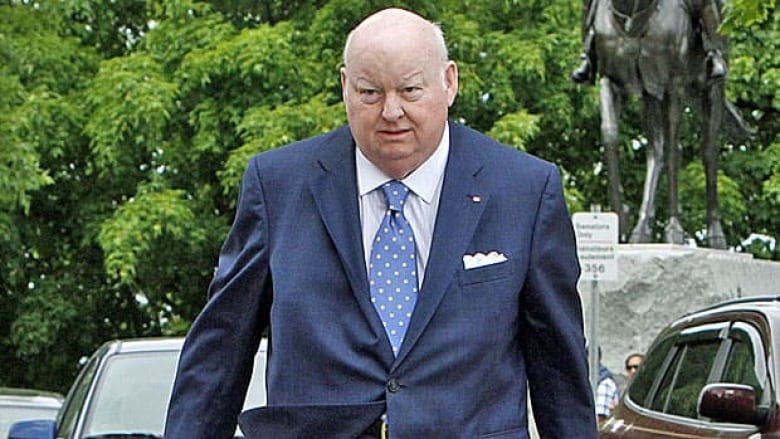Chris Hall: Why the Mike Duffy Senate scandal still perk-olates
How to explain Duffy's 'expanded role within the party'

Two weeks in and the Senate expenses scandal involving former TV journalist Mike Duffy lives on. And once again, the fuel keeping it alive comes from an email written by the senator himself.
CBC News obtained a copy of a message Duffy sent to a Conservative strategist in July 2009 — just six months after Prime Minister Stephen Harper named him to the Senate — asking for advice on how he should be compensated for ''my expanded role with the party.''
He'd already discussed the idea with fellow Conservative Senator Irving Gerstein, who also happens to chair the party's hugely successful fundraising arm.
In the email, Duffy wrote that Gerstein had said ''what do I want/need and he'll make it happen."
Duffy then suggested to Gerstein that he (Duffy) be made a junior cabinet minister to get the staff, car and resources that go with the position.
"He (Gerstein) laughed and said he didn't think THAT was within the realm of the Cons. Fund,'' Duffy wrote. "So my question is what do I demand?"
He goes on. "Should I request a one-on-one with Stephen.''
The answer to the first question — what do I demand? — remains a mystery. Gerstein did not respond to interview requests, and Duffy would not elaborate when contacted by the CBC.
But the prime minister's office says there was never any one-on-one with the now independent senator about his role in the party, and he was never considered for a cabinet position.
Even so, the email underscores the predicament Duffy and the Harper government are in today.
Duffy may not have received any special cabinet-like perks four years ago. But if Gerstein and the Conservative Fund were so willing to backstop his political work, why did the prime minister's former chief of staff, Nigel Wright, feel the need to step in and pay the $90,000 to cover Duffy's questionable Senate expenses?
Damage control
Conservative insiders have acknowledged the former broadcaster was one of their best fundraisers and biggest political draws.
In fact, his reputation for both was so highly regarded that when Harper took to the road in 2009 to sell the new Conservative budget, he took Duffy along at one point to serve as warm-up act and master of ceremonies.
Duffy was also a regular on the campaign trail in 2011. Records show he billed local campaigns for those appearances, sometimes on days when he also claimed to be on Senate business.
This double billing is just part of the larger issue that Duffy will have to address at some point.
The Senate voted this week for a do-over of the original audit into his expenses, and it endorsed a proposal initiated by his former Conservative colleagues to formally ask the RCMP to investigate.
The issue confronting Harper is how to contain the political damage, and so far nothing is working.
The fallout has already deprived the prime minister of the services of his chief of staff. But even that hasn't staunched the wound.
At first, certain cabinet ministers applauded Wright's decision to repay Duffy's dubious expenses with $90,000 out of his pocket. Saving taxpayers' money, they said.
When that failed, they praised Wright for resigning and accepting sole responsibility. It was the honourable thing to do, they said.
But when more questions were raised in the Commons about what the prime minister knew about the Wright-Duffy entanglement, and about why he waited almost five days to accept Wright's resignation, the Conservatives reverted to a more familiar tactic.
Harper and Heritage Minister James Moore went on the attack, accusing the New Democrats and Liberals of expenses and tax-avoiding scandals of their own.
'The facts are clear'
Harper missed Question Period on Thursday, or perhaps a better word is skipped. Either way, he still couldn't escape the controversy.

Reporters took advantage of a joint news conference with Chilean President Sebastian Pinera to ask the prime minister how he could not have known about Wright's role in repaying the money.
"Yeah, look,'' the prime minister said, his tone curt. "Very briefly the facts in this case are clear. They are absolutely clear. They are not good. But they are clear and they are simple.
"Mr. Wright decided to use his own personal money to assist Mr. Duffy to reimburse the taxpayers of Canada. That's what he decided to do and he decided not to tell me until the 15th of May after speculation about the source of the funds appeared in the media.''
Had he been told, the prime minister added, ''I would have said not to do it.''
Strategists will no doubt debate the wisdom of the government's evolving responses, and the effectiveness of responding to a scandal by accusing their opponents of being just as bad.
But there's no debate that this scandal is far from running its course.
Two weeks in, and the Harper government is no longer dealing with just inappropriate expense claims by Duffy (and a handful of others senators) and the lone actions of a trusted adviser.
It has now become a serious challenge to the government's own competence and failure to fully own up to the Duffy-Wright business at the first opportunity.
And for that, the prime minister and his team have no one to blame but themselves.

